DPC
DPC Response to Digital Britain: The Interim Report
DPC promotes long term access in Digital Britain.
Full DPC Response to Digital Britain: The Interim Report (March 2009)
Introduction
- The Digital Preservation Coalition (DPC) is a not-for profit membership organisation whose primary objective is to raise awareness of the importance of the preservation of digital material and the attendant strategic, cultural and technological issues. It acts as an enabling and agenda-setting body within the digital preservation world and works to meet this objective through a number of high level goals. Its vision is to make our digital memory accessible tomorrow.
- The Digital Preservation Coalition welcomes the opportunity to comment on the Digital Britain Interim Report. We seek opportunities to work more closely with the Digital Britain team in refining and delivering the digital strategy that their Interim Report delineates.
- We support the broad conclusions of the Interim Report in identifying the essential architecture of the government’s digital strategy. In particular we note the considerable contribution that production and re-use of digital content makes to the British economy. We are encouraged in our response by the Government’s previously stated view that the contribution of the creative industries to the UK economy must move from the margins to the mainstream of economic policy.
- In summary, our response is to call for greater clarity and consideration of digital legacy, especially where this pertains to content. This can be achieved through greater collaboration between the producers of content and those memory institutions – principally but not exclusively data services, archives, museums and libraries – charged with curating and preserving this generation’s digital legacy.
- It is our contention that appropriate consideration of the long-term of digital content will deliver long-term competitive advantage into the UK economy.
- We seek opportunities for knowledge transfer between those who already have skills in the long term curation and preservation of digital content (such as the DPC membership) and the creative industries producing new content.
Digital networks
1. We note and welcome attention paid to the development of a new generation of network infrastructure for the UK. The extension and embedding of high capacity networks for home and business are as essential to the development of the economy.
2. The value of high quality digital content will increase as access to it becomes easier. The transformation of network capacity implies a concomitant growth in the consumption creation and re-use of digital content. This presents an opportunity and challenge for the long-term.
3. The proliferation of new content suppliers means that the UK will need to be more sophisticated and more widely skilled in the curation and preservation of digital content if it is to have a lasting impact on the economy. So, in parallel with the expansion of the network, the UK requires to build capacity for preservation and curation of digital content.
4. This can in part be achieved through refinement and planned investment in the skills and resources required to preserve digital content. We believe that this represents an opportunity for knowledge transfer from DPC members to the creators of digital content.
5. We note that paradigm shifts in broadcasting have historically been moments of unplanned loss of content. We call for broadcasters to examine the risks to content in their planning for migration to new platforms.
Digital Content
6. We note and welcome the attention paid to issues surrounding digital content, especially the discussions about the creation of digital content.
7. We note, in the words of the Blue Ribbon Task force on Sustainable Digital Preservation and Access , that ‘access to data tomorrow requires decisions concerning preservation today’ (2008, 1).
8. Experience shows that preservation and curation of digital content is facilitated by early intervention. Dependable access can to some extent be built in at the point of creation, while digital archaeology is expensive and impractical on the large scale. In short digital legacy planning ought to become business as usual.
9. We believe that there is an opportunity for meaningful knowledge transfer between DPC members and the creators of content to enhance the durability of their content.
10. The effective exploitation of intellectual property happens over decades not years. Consequently, we believe the report’s ambitions to provide greater clarity for intellectual property management needs to be positioned in a framework where the content remains fit for purpose over decades.
11. While the DPC has no particular view on the detail of the intellectual property issues in the report, it is keen to ensure that intellectual property laws do not act as a barrier to appropriate preservation activities.
12. Consideration must be given to the rights, responsibilities and legal protections of those engaged in the long term preservation of our digital heritage.
13. We note and welcome the discussion of new business models for digital content. This underlines the importance of effective exploitation of legacy content to create revenue streams. This is facilitated by more careful consideration of long-term access.
14. While we want businesses to thrive, we call for more effective planning to support preservation and access to digital resources from businesses that fail.
Universal Connectivity
15. We note and welcome the aspiration that everyone in the UK should be able to participate in the digital economy. We note again the implication for content creation and distribution and what this means for ensuring a cultural legacy (see point 8-10).
Equipping everyone to benefit
16. We note and welcome the concern with digital skills articulated in the Interim Report.
17. We note that digital preservation is a relatively new discipline. Better long-term planning and exploitation of digital content will best be achieved by investing in people, specifically by ensuring that the right parts of the workforce have access to appropriate training and career paths.
18. The UK has made a significant contribution in the development of digital preservation and curation. This contribution provides a competitive advantage for the creative industries and cultural heritage sector, and creates an opportunity for knowledge transfer between DPC members and content creators.
References
Blue Ribbon Task force on Sustainable Digital Preservation and Access (2008) Sustaining the Digital Investment: Issues and Challenges of Economically Sustainable Digital Preservation (Interim Report)
William Kilbride, Executive Director of the Digital Preservation Coalition
March 2009
PDF of Full DPC Response to Digital Britain: The Interim Report (March 2009) (70KB)
More information and the full Digital Britain: The Interim Report can be found at: http://www.culture.gov.uk/what_we_do/broadcasting/5631.aspx
The Digital Britain discussion site: http://www.digitalbritainforum.org.uk/
News from our partners
Added on 1 October 2009
The DPC is not responsible for the content of remote websites. If you are a DPC member and would like to syndicate content to this page please contact us.
English Heritage
Added on 29 September 2009
We are delighted to announce that English Heritage has become the latest organisation to join the Digital Preservation Coalition as an associate member.
English Heritage is the lead body for the conservation of England’s historic environment. The research and documentation which EH carries out and which it funds in the wider sector to support this remit is increasingly created and disseminated in digital formats, sometimes using techniques which are at the cutting edge of new technologies. It is crucial that this work remains accessible to future generations so that it can continue to inform understanding and management of the historic environment.
Mike Evans, Head of Archives for the English Heritage National Monuments Record, explained, 'Over 18.5 Tb of data is held by the National Monuments Record and very large volumes of data collected or funded by EH are held on local servers or curated by third parties.
'In an era in which the study and the management of the past around us depends more and more on digital tools and communication, we believe that the work of the Coalition and its members can help EH make a real contribution to safeguarding the collective memory of the historic environment sector
'We're very pleased to be joining the Digital Preservation Coalition.'
Bruno Longmore, Acting Chair of the DPC and Head of Government for the National Archives of Scotland, welcomed English Heritage to the coalition.
'Our members represent very diverse agencies, in public and professional practice. This is not surprising: the challenge of long term and reliable access to data is one that many organisations face. By joining, English Heritage have not only got access to the resources and support of the coalition to help face that challenge, but they have also clearly signalled that they are serious about working to resolve this challenge.'
English Heritage Joins DPC
Added on 29 September 2009
We are delighted to announce that English Heritage has become the latest organisation to join the Digital Preservation Coalition as an associate member.
JISC Digitisation Programme: Preservation Study
A DPC led consortium of the ULCC and Portico, undertook a study on behalf of JISC to review the preservation of the JISC Phase 2 digitisation programme. The successful proposal is available here.
DPC successful proposal (PDF 362KB)
A project blog is available at http://digipressurvey.jiscinvolve.org/
Case Studies
- Freeze frame [PDF 642KB]
- Archival Sound Recordings [PDF 699KB]
- Cabinet Papers
- Wels Jourmals
Missing Links: the Enduring Web
JISC, the DPC and the UK Web Archiving Consortium Workshop
Venue: The British Library Conference Centre, London
- Full Conference Report [PDF 337KB]
- Presentations from the conference (see below)
- Conference report from Peter Webster and Jane Winters, Institute for Historical Research (external website)
- Conference report from Alexandra Eveleigh, West Yorkshire Archive Service (Ariadne)
- Conference report from Jonathan Clark's Blog
- Conference report from Marieke Guy
The web runs at risk. Our generation has witnessed a revolution in human communications on a trajectory with the origins of the written word and language itself. Early web pages have an historical importance with prehistoric cave paintings or proto-historic pressed clay ciphers. They are just as fragile. The ease of creation, editing and revising gives content a flexible immediacy: ensuring that sources are up to date and, with appropriate concern for interoperability, content can be folded seamlessly into any number of presentation layers. How can we carve a legacy from such complexity and volatility?
Key issues for long-term access and preservation remain unresolved. How can content creators make sure their creations are durable without impairing their flexibility? How does web-archiving relate to data-curation and traditional archiving? What constitutes an appropriate legacy from a web site? What audiences should web archives anticipate and what does this mean for selection, ingest and preservation? What will the web be like as an historical source, and what use will be made of archived web sites by future generations? How will they validate them? How will they cite them? What are our missing links? How can these be filled?
The challenges of web archiving have long been recognised and there are a number of tools and services that already offer – or purport to offer – long-term access to web content. But gaps remain in policy, expertise and implementation and the tools for web-harvesting need a clearer link between the technical needs of preservation services and the deferred needs of user communities.
Only by developing and strengthening the links between content creators, tools developers, preservation services and users can we hope to secure an enduring web.
Sponsored by the Digital Preservation Coalition (DPC) and the Joint Information Systems Committee (JISC) the six partners of the UK Web Archiving Consortium (British Library, National Library of Wales, JISC, Wellcome Library, The National Archives and the National Library of Scotland) are organising a joint workshop on the 21st July 2009 at the British Library Conference Centre, Euston Road, London.
This event will bring together key stakeholders – archive managers, preservation experts, national libraries, web archivists and content providers - for practical and focussed discussion on shared perspectives, requirements, problems and solutions. Formal presentations and case studies will be presented with an opportunity for posters and demonstrations of tools. The day will close with a plenary discussion and a follow up Report.
Who should come?
- Web editors and web site managers
- Web archivists
- Archive managers
- Digital preservation and curation specialists
- Researchers interested in the web as an historical resource
- Librarians and policy makers with interests in electronic legal deposit
Why should you come?
- Help to shape the UK’s web archiving agenda
- Learn from organisations currently preserving websites
- Share your preservation concerns and aspirations
- Understand new services and projects working in web archiving
- Anticipate the evolution of a rapidly changing field
- Contribute your web archiving expertise to the repository community
Programme
|
0900-09:30 |
Registration |
|
0930-09:40 |
Welcome & introduction |
|
Session 1: Setting the scene |
|
|
09:40-10:20 |
Keynote & questions [PDF 2.37MB] |
|
10:20-10:40 |
Web Archive and Citation Repository in One: DACHS [PDF 1.33MB] |
|
10:40-11.00 |
The future of researching the past of the Internet [PDF 7.02MB] |
|
11.00-11.30 |
Morning coffee break |
|
Session 2: Creation, capture & collection |
|
|
11.30-11.50 |
Web Archiving Tools: An Overview [PDF 554KB] |
|
11.50-12.10 |
Context and content: Delivering Coordinated UK Web Archive to User Communities [PDF 2.03MB] |
|
12.10-12.30 |
Capture and Continuity: Broken links and the UK Central Government Web Presence [PDF 1.45MB] |
|
12.30-12.45 |
Questions and discussion |
|
12.45-13.30 |
Lunch break and exhibition |
|
Session 3: Issues and approaches to long term preservation of web archives |
|
|
13.30-13.50 |
Diamonds in the Rough: Capturing and Preserving Online Content from Blogs [PDF 2.07MB] |
|
13.50-14.10 |
Beyond Harvest: Long Term Preservation of the UK Web Archive [PDF 577KB] |
|
14.10-14.30 |
From Web Page to Living Web Archive [PDF 9.55MB] |
|
14.30-14.50 |
Emulating access to the web 1.0 [PDF 3.05MB] |
|
14.50-15.00 |
Questions |
|
15.00-15.15 |
Afternoon tea break |
|
Session 4: Discussion and next steps |
|
|
15.15 – 15.40 |
What we want with web-archives; will we win? [PDF 1.07MB] |
|
15.40-16.40 |
Roundtable – all speakers in question time format |
|
16.40 - 16.45 |
Thanks and close |
Photographs
These photos are only a selection and are relatively low resolution: a full set and higher resolutions are available.
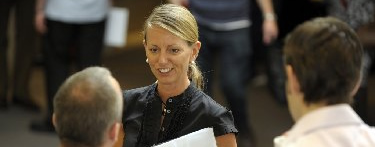
Carol Jackson, DPC
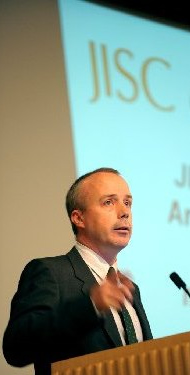
Neil Grindley, JISC
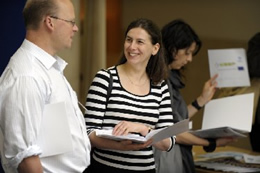
Registration
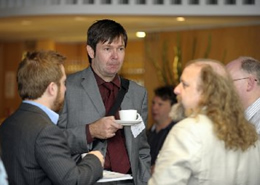
Richard Davis, ULCC
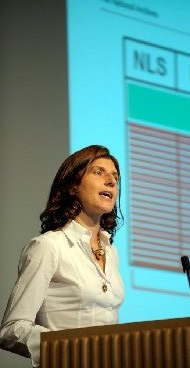
Cathy Smith, TNA
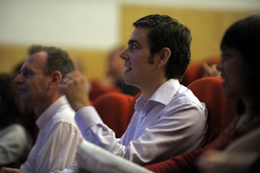
Jeffrey Van Der Hoeven, KB
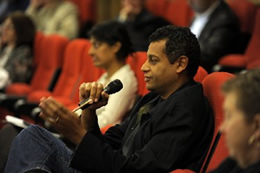
Question and Answer
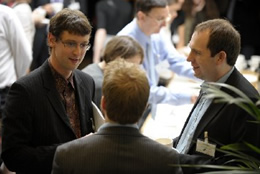
Discussion
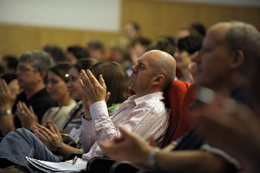
Question and Answer
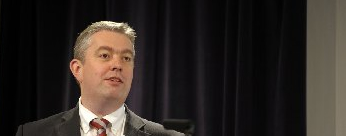
William Kilbride, DPC
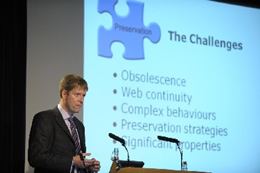
Adrian Brown, Parliamentary Archives

Audience
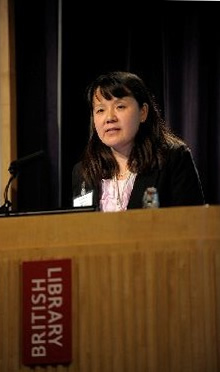
Helen Hockx-Yu, BL
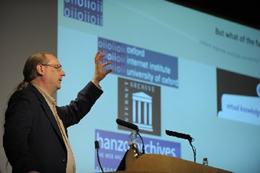
Eric Meyer, Oxford University
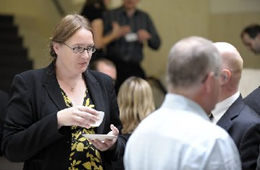
Maureen Pennock, BL

Thomas Risse, L3S Research Center
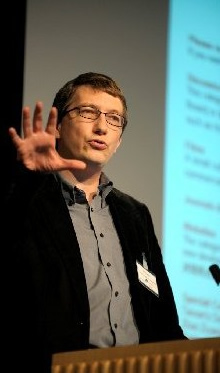
Hanno Lecher, Leiden University
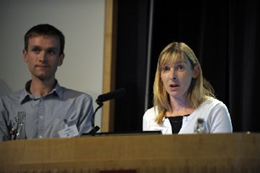
Amanda Spencer and Thomas Storrar, TNA
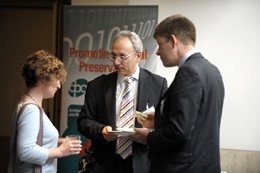
Discussion
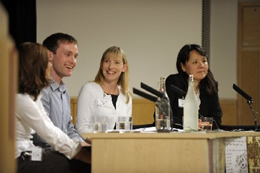
Question and Answer
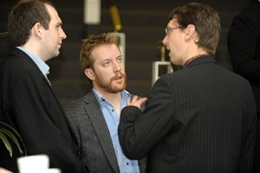
Discussion
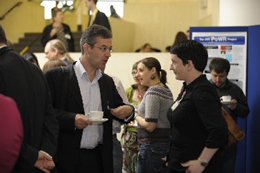
Discussion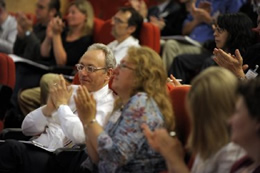
Audience
Conference Report: Curating Research: e-Merging New Roles and Responsibilities in the European Landscape
17 April 2009, The Hague, Koninklijke Bibliotheek, The Netherlands
1. Summary of issues relevant for DPC members
- Training is popular but what sort of training will be most effective: what will drive down costs and support our work best?
- Considerations of scale: what is the right size solution to our digital preservation challenges? Do we want lots of small DP facilities or a small number of large ones?
- How do we collaborate without undermining institutions?
- There would appear to be a lot of policy development which is an important change from a decade ago: but how do we assess the value of these emerging policies and how do we know if they are being applied?
- There is still a policy gap. There are some high level aspirations in the UNESCO Charter and some very detailed guides, but a gap in between. What would be our
- golden rules for creating digital data?
Tackling the Preservation Challenge: Practical Steps for Repository Managers
DPC/RSP/DCC/JISC Workshop![]()
![]()
![]()
![]()
A podcast from this event is available to download from:
http://www.rsp.ac.uk/podcasts/preservation.php
Speakers at the event tell us about practical tools and services to help repositories. Featuring contributions by Frances Boyle, Neil Beagrie, Barbara Sierman, Chris Awre, David Tarrant, Chris Yates, Rory McLeod, Adrian Brown, Kevin Ashley and Matthew Woollard.
We all know that preservation of repository content is vital -- but we also know that in practical terms it remains largely unresolved. What should we be doing right now to embed preservation into the working practice of repositories? Who should we be talking to?
Are there tools and services out there which can support repository managers in their work today? Are preservation experts and services tuned into the practical workflow requirements of their repository manager colleagues? If this has any resonance then this event is for you!
The Digital Preservation Coalition (DPC), the Repositories Support Project (RSP), the Digital Curation Centre (DCC) and the JISC are organising a joint workshop on the 12th December at the Novotel Hotel, Euston, London. The intention is to bring together key stakeholders, the repository managers and preservation experts, at a practical focussed event to talk together and share perspectives, requirements, problems and solutions. It is hoped that the workshop will lead to collective recommendations for what the next moves for repository managers and preservation specialists should be to provide practical focussed support, services and tools. The workshop should in addition further repository managers’ understanding of how to implement preservation strategies and processes.
As well as the formal presentations there will also be a marketplace when there will be an opportunity to view posters, and engage with project teams and see demonstrations of the latest tools. The day will close with a participative discussion session.
Prior to the event the organisers shall gather concerns and requirements from repository managers and preservation experts/services and synthesise these into 'Top 5 Concerns', 'Top 5 Wishes' and 'Top 5 Solutions' (for practical implementation). These will then be collated to form the basis for the panel discussion.
Who should attend?
Repository managers, librarians, archivists, digital preservation experts, information management specialists, service providers.
Benefits of attendance
- An opportunity to share your preservations issues, (concerns, wishes, solutions) with peers and experts.
- To gain insight from repository managers on how they are approaching preservation on different platforms.
- To get up to speed with the outcomes from the extant services and projects working in this important area.
- To gain some tips from fellow practitioners on what works for them.
- To share your digital preservation expertise with the repository community
REGISTRATION NOW CLOSED
Programme
|
Chair: Dr. Les Carr, Director of EPrint Services, University of Southampton |
|
|
09:30 ‑ 09:55 |
Registration and Coffee |
|
09:55 - 10.00 |
Welcome and Introduction |
|
10:00 - 10:30 |
Keynote Presentation – The Importance of Digital Preservation [PDF 81KB] |
|
10:30 ‑ 11:00 |
Digital Preservation at the National Library of Netherlands (KB). Experiences from the Driver Project and E-Depot [PDF 406KB] |
|
11:00 - 11.15 |
Break and Coffee |
|
11.15 - 12.00 |
Market Place Projects and Demonstrations:
|
|
12:00 - 13:00 |
Case Studies: Fedora [PDF 942KB] |
|
13:00 - 14:00 |
Lunch |
|
14:00 - 14:20 |
LIFE2 [PDF 1.0MB] |
|
14:20 - 15:05 |
Service Providers: ULCC [PDF 1.6MB] |
|
15:05 - 15:20 |
Break and Coffee |
|
15:20 - 16:05 |
Panel Discussion led by Les Carr |
|
16:05 - 16:10 |
Closing Remarks |
Digital Preservation Planning: Principles, Examples and the Future with Planets
![]()

PLANETS and the Digital Preservation Coalition (DPC) will be holding a joint briefing day: Digital Preservation Planning: Principles, Examples and the Future with Planets, on the 29th of July 2008, at the British Library Conference Centre, St Pancras, London.
The event will be an informal and interactive workshop allowing attendees to share knowledge and experience in digital preservation planning, setting strategy and policy plus first-hand experience of Planets tools and technology.
Attendees will also hear from DPC members about the approaches they have used in their organisations and the outcomes. There will be plenty of opportunity to ask questions and for discussion.
Planning is crucial to the process of preserving digital information and data. Planets has taken preservation planning as its research focus. From mid 2010, Planets will deliver downloadable software to help organisations plan and execute preservation activities.
Benefits of attendance
- Understanding of aspects of preservation planning, policy and strategy setting
- Real-life insight into other organisations’ approaches to preservation planning
- Awareness of the range of services and tools Planets will deliver
- Hands-on experience of Plato, Planets’ preservation planning tool
- Insight into identifying the characteristics of digital objects
- Understanding of working in a testbed environment
- An opportunity to ask questions and for discussion
Who should attend?
The event will appeal to anyone involved at any stage in digital preservation policy, strategy and planning cycle. (e.g. librarians archivists, digital librarians and archivists, repository mangers, software developers, vendors, policy managers etc and others working in a wide range of settings).
Programme
|
Time |
||
|
9.00 |
Registration and coffee |
|
|
Morning Session Chair – Frances Boyle, DPC |
||
|
09.30 |
What's it all about? Scene Setting & Overview for the Day (PDF 406KB) |
Frances Boyle, DPC |
|
10.15 |
Andreas Rauber, Vienna University of Technology |
|
|
10.45 |
Constructing a Preservation Policy: the case of the UK Data Archive (PDF 378KB) |
Matthew Woollard, UKDA |
|
11.15 |
Break and Coffee |
|
|
11.30 |
Natalie Walters, Wellcome Library |
|
|
12.00 |
Preservation Planning (Part 1): Workflow and the Plato tool (PDF 2.2MB) |
Christoph Becker, Vienna University of Technology |
|
12:30 |
Lunch |
|
|
Afternoon Session Chair – Frances Boyle, DPC |
||
|
13:00 |
Preservation Planning (Part 2): Simulation and practical exercises |
Christoph Becker & Andreas Rauber, Vienna University of Technology |
|
14.10 |
Christoph Becker |
|
|
14.30 |
Manfred Thaller, University of Cologne |
|
|
15.00 |
Break and Coffee |
|
|
15.15 |
Matthew Barr, HATII, University of Glasgow |
|
|
16.15 |
Interactive discussion session |
Prof. Kevin Schürer, UKDA |
|
17.15 |
End |
|
Key to acronyms:
| PLANETS | Preservation and Long-term Access through NETworked Services |
| UKDA | UK Data Archive |
| HATII | Humanities advanced Technology and Information Institute, University of Glasgow |
Mind the Gap: Assessing Digital Preservation Needs in the UK
June 2008
The Review Board for the ITT 'Mind the Gap' - follow up study reviewed responses to the ITT in mid-June. Whilst the Review Board found much to commend in the proposals it was decided not to award a contract at this time. The brief will be re-scoped to focus on actions for which the DPC or its members can take responsibility for and it will have a strong practical and achievable focus.
The 'Mind the Gap' report was published with 21 recommendations aimed at a range of stakeholders. To gauge which of these are the most important to the DPC community, members were asked to participate in a survey to consider the final 'Mind the Gap' recommendations. They voted on which recommendations would impact on their work and deliver the greatest benefit to the digital preservation community if achieved successfully.































































































































